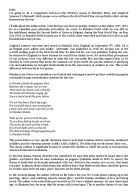History and Memory: The Fiftieth Gate. In Bakers The Fiftieth Gate (1999), the author attempts to create a balanced account of the past (i.e. One that is true, historically and emotionally relevant), while in Kimels poem, Do I Want to Remember?
The challenge of presenting a balanced representation of the past through the exploration of history and memory is dealt with very differently by the two composers Mark Baker and Alexander Kimel a direct result of their varying purposes. In Baker’s The Fiftieth Gate (1999), the author attempts to create a balanced account of the past (i.e. One that is true, historically and emotionally relevant), while in Kimel’s poem, “Do I Want to Remember?” (1989), the purpose is not so much in representing a balanced account of the past as it is a conscious decision to represent only the emotional and memory-oriented aspects of the past .To this end, the varying degrees to which the past is presented as balanced representations of history and memory is a direct result of the author’s purpose: Baker’s challenge being to accurately trace his parents’ lives, Kimel’s challenge being to record the emotional suffering of his father.
The challenge of presenting a balanced representation of the past is combatted in Mark Baker’s memoir The Fiftieth Gate by using both history and memory in conjunction” using one to vindicate the other. Baker’s purpose is to broaden his understanding of the Australian survivors of the Holocaust by retracing his parents’ lives during the Holocaust. As such, Baker’s memoir is a journey towards redemption, as symbolised by the motif of gates: “whoever enters the fiftieth gate sees through God’s eyes from one end of the world. The darkness and the light.” The dichotomy of light and dark is used by Baker to represent the very challenge of presenting a balanced account of the past, the metaphor representing the truth and ambiguity. Thus Baker attempts to elucidate the past by using history and memory in conjunction to create a complete past, and to fill in the gaps in his knowledge. This is highlighted in Baker’s appropriate of Dan Pagis’ poem “Written in Pencil in the Seated Railway-Car,” changing it so that it is pertinent to his parents’ story. The poem itself is unfinished, “here in this carload… tell him that,” the result of which is a reflection of his desire to represent a whole and complete past: “I am Hinda, tell him that I.” Baker acknowledges the flawed nature of both history and memory, indeed this is the very reason for the challenge of presenting a balanced past. As an historian, early in the memoir, Baker has a tendency to rely more on history than memory, constantly using lists and historical documents to validate the past, such as Graetz’s Geschitche der Juden,” and the use of his grandparents’ wedding certificate. The result of this however is a lack of emotion: history by itself cannot explain the torment of a child forced to live in darkness for two years, or the anguish of a thirteen year old forced to watch his mother taken to be gassed. To this end, history is represented as cold and clinical: “what are these sheets of paper anyway except echoes of the past, dark shadows without screams.” This over-reliance on history leads to conflict with his parents, as seen in the constant use of the clinical onomatopoeic refrain of “tak tak tak” and “Left. Right. Left. Right” to demonstrate the objectivity inherent in history. Baker’s parents berate his use of “fecks,” and indeed he himself admits his shame in having doubted his parents’ memories. Thus by demonstrating the clinical nature of historical sources, Baker shows the challenges of presenting a balanced representation of the past.







